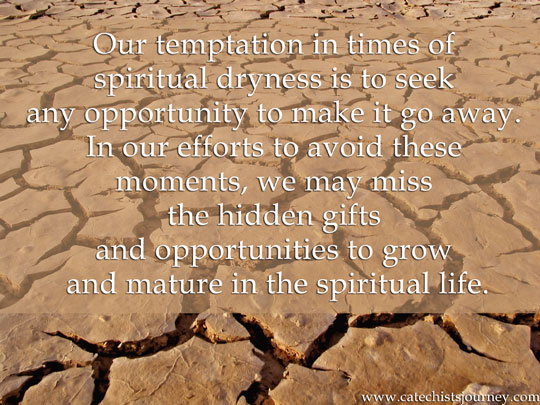-by Rev Gabriel of St Mary Magdalen, OCD, Divine Intimacy, Baronius Press, (c) 1964
Presence of God – Enkindle in me, O Lord, the fire of the apostolate and feed it with Your love.
MEDITATION
Just as a seed cannot produce a stalk which will bear a new ear unless it first buries its roots deep in the ground, so we cannot bear fruit for the apostolate if we do not first put forth the roots of a deep interior life, enabling us to draw from God Himself the sap which will make us fruitful. The interior life is the vital principle, the force, and the flame of the apostolate; but on the other hand, the apostolate brings its contribution to the interior life, helping to make it more generous and more intense. When a soul is fired with zeal for the apostolic life, its very desire to win other souls for God impels it to devote itself with greater generosity to prayer, mortification, and the practice of the virtues, with the intention of making itself more capable of a fruitful apostolate. Thus, while the interior life is the soul of the apostolate, the apostolate in its turn is a very powerful mainspring urging the soul on to union with God, to perfection, to sanctity. The apostolic ideal is of its very nature a generator of spiritual energy and a spur to a generous, holy life. St. Teresa of Jesus, moved by an ardent desire to counteract the great havoc wrought by the Protestant heresy in her times, stamped the reform she initiated with a seal of particular austerity and organized the life of her daughters in such a way as to engage them in a continual exercise of prayer, sacrifice, and self-giving for the salvation of souls (cf. Way of Perfection, 1). The rule of life of the Teresian Carmel, a contemplative life of profound intensity, was thus born of a great apostolic ideal.
The same ideal has recently given rise to a new state of perfection in the Church, the Secular Institutes, in which souls desiring to consecrate themselves to God for the salvation of souls, pledge themselves to a life of evangelical perfection in the world. “The specific end [of the apostolate] seems of necessity to demand and even to create the generic end [of perfection]” (Venerable Pius XII Primo Feliciter).
When the apostolic ideal is alive and well understood, it does not plunge souls headlong into activity; it rather guides them to a deeper interior life, to the total gift of self, to sanctity, for we ourselves must be holy before we can make others holy. “And for them do I sanctify Myself” (John 17:19).
COLLOQUY
“O Lord, there come to me desires to serve You with impulses so strong that I cannot describe them, and with a distress caused by the realization of my own unprofitableness…. I think I should like to cry aloud and tell all souls how important it is for them not to be contented with just a little in Your service, and how many blessings there are which You will give us if we prepare to receive them.
O my God, I experience very deep distress because of the great number of souls who are bringing damnation upon themselves, especially of those who were members of the Church through Baptism, and I greatly desire to labor for their salvation, so much so that I really believe that, to deliver a single one of them from such dreadful torments, I would willingly die many deaths…. Who could bear to look upon souls condemned for eternity to endless suffering? Even earthly suffering which, after all, has a limit and will end with death, moves us to deep compassion. And that other suffering has no limit: I do not know how we can look on so calmly and see the devil carrying off as many souls as he does daily.
Thou knowest, my God, how grieved I am to see how very many are lost. Save at least one, Lord, at least one who can give light to many others, and this not for my sake, Lord, for I do not merit it, but for the merits of Thy Son. Look upon His wounds, Lord, and as He forgave them who inflicted them upon Him, so do Thou pardon us.
My God, I want nothing but Your will; submission to it has such power over me that my soul desires neither death nor life. But then, if such be Your will, I desire to live, in order to serve You better. If, through my intercession, I could do anything to make a single soul love and praise You more, and that only for a short time, it would seem to me of greater moment than my being in glory” (Teresa of Jesus Spiritual Relations 1 – Life 32 – Exclamations of the Soul to God 11 – Spiritual Relations 6).”
Love,
Matthew













